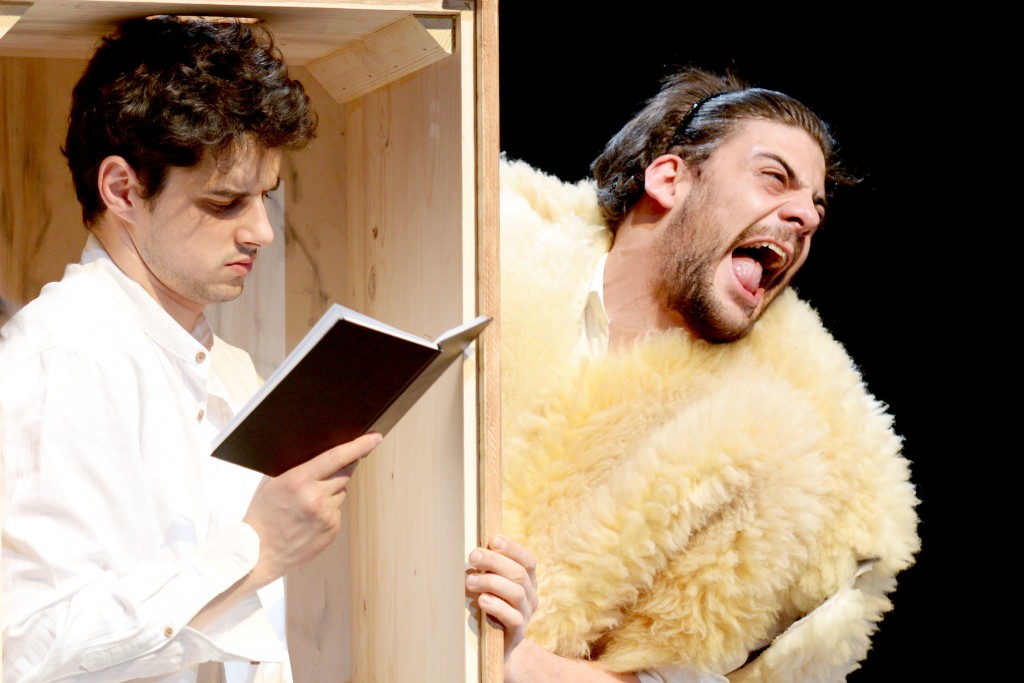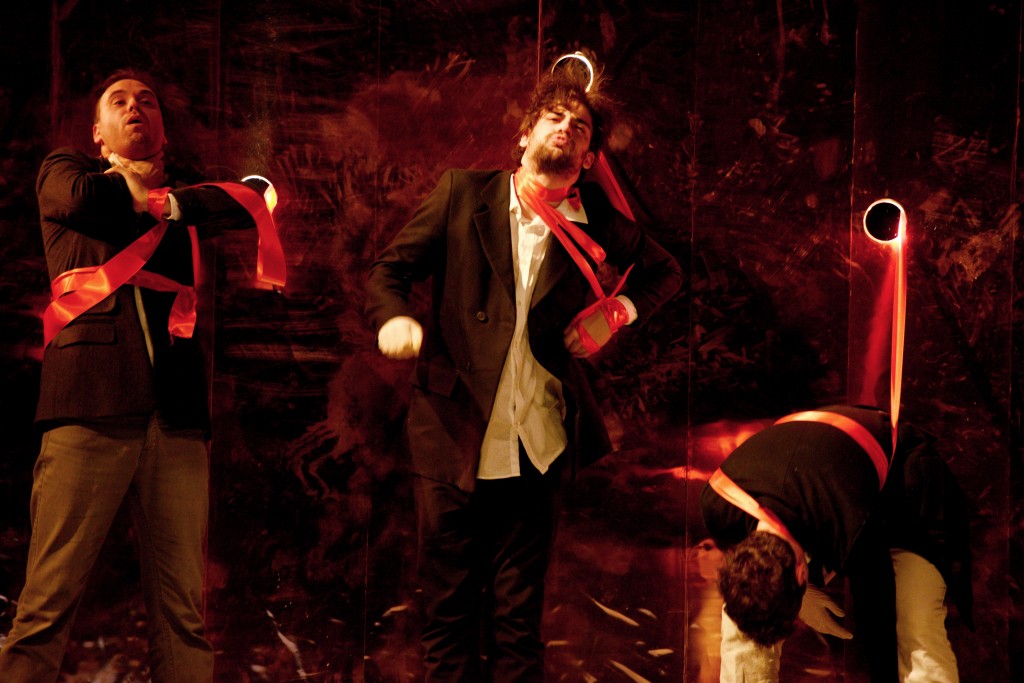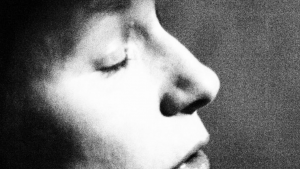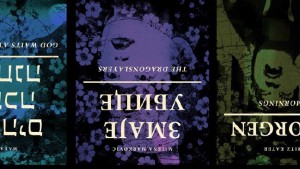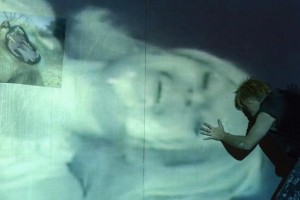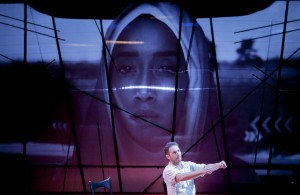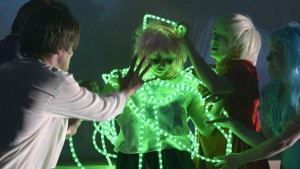THE DRAGONSLAYERS, a play by Milena Markovic, directed by Iva Milošević, is a project which recontextualises Gavrilo Princip and the centenary of the Sarajevo assassination.
Does contemporary Serbian theatre hold answers to historical questions and what has Yugoslav Drama Theatre said with this ‘heroic cabaret’?
“Our shadows will walk in Vienna, haunting the court, scaring gentlefolk”, Gavrilo Princip wrote on the wall of his prison cell in Terezín in today’s Czech Republic, one time Austro-Hungarian empire, then in its terminal phase of decomposition, as was the body of the Archduke Ferdinand’s assassin who was thrown into a communal grave with “some thieves…”. This was revealed on 7 June to the audience of ‘The Dragonslayers’ by Milena Marković, directed by Iva Milošević, by a conscientious Czech corporal of said empire (played by Mirjana Karanović) infected by panslavism and moral pressure within.
The graffiti (the word created by coding into contemporary Serbian) from the wall of Princip’s cell inspired two of the most prominent and most produced Serbian playwrights, Biljana Srbljanović and Milena Marković, to address — in two respective plays, both commissioned by theatres, the former by the Schauspielhaus of Vienna, and the latter by the YDT — the subject of 100 years of the Sarajevo assassination and its implications not only on the history of these regions but also on the interpretation of the motives of the members of Young Bosnia themselves. It is difficult to avoid comparisons between the two plays since both address the same subject matter in a similar post-dramatic dramaturgical key. It is also very ungratifying to make comparisons, since, however similar they might appear at the first glance, the plays, and their respective stagings in particular, are quite different. Still, this article will primarily focus on ‘The Dragonslayers’, and not on a comparative analysis of this play and ‘This grave is too small for me’ by Biljana Srbljanović. The production begins with a recontextualisation of the position of Young Bosnians and their revolutionary ideas by drawing pop-cultural parallels to punk and recent European leftist-anarchist movements which see Europe, just as they did in 1914, as an ossified, bureaucratised shambles in search of exploitation of the poor and the small, the more brutal the better. This move, in which the actors wear contemporary clothes and shout (or sing in songs with a Brechtian V-effect) the slogans of “the brave new Europe”, very clearly establishes the symbolic plane of the story of Princip, even though — except in a direct and slightly superficial way — it hasn’t even started: it all happened for the very same reasons for which the European Union is collapsing now — social ones.
Putting the Young Bosnians in a social context continues for the following half an hour of the show with a series of cabaret miniatures whose purpose, since this is a paratheatrical genre that appears and reaches its zenith in the early 20th century, is to present the spirit of the time in which the Young Bosnians decide to do what will, in visual codification by the director Iva Milošević, turn them into pop-culture fairytale-like heroes — the Dragonslayers. As soon as the directorial and dramaturgical narration begins with the Young Bosnians (Princip, Ilic, Cubrilovic, Cabrinovic) and their biographies, as well as their intimate motivation for the assassination, the show actually begins, gaining the necessary fullbloodedness, establishing the relationship with the audience.
The accounts in the form of dramatic miniatures by Milena Marković were directed as a cabaret programme with the required ironic distance, but clear emotional engagement and impressive underlining of clear motivation in poverty and misery, oppression and humiliation that peoples of Bosnia and Herzegovina, primarily in a social and societal sense, endure from the Austro-Hungarian annexation government. These episodes have enough historical and dramaturgical realism to make any viewer believe them, but also a clear stylistic distance, and that in terms of meaning, in dramaturgical elements of post-dramatic theatre and a poetic distance that Milena Marković always uses in her plays and director’s setting of the cabaret. Scenes of intimate farewells to a petit bourgeois family environment, a pathetic rural environment or an intellectual humiliation serve as an excellent overture to dramatic (as well as historiographic) culmination in the scene of the assassination. And it is there, as far as this text is concerned, that the sole and crucial comparison with the production of ‘This Grave is Too Small for Me’ directed by Dino Mustafic is in order: while the latter sets the Young Bosnians in a free and quite unfounded signification relation to Serbian nationalism of the 1990s and plots of Milorad Ulemek Legija, ‘The Dragonslayers‘ lack political and ideological level, both in symbolic and dramatic terms. This level is, in the narration of the production, solved after the very assassination with the processing of transcripts from the trial and statements made by the Young Bosnians themselves, but it steps out of the narrative construction, and, following the assassination and rounded story about its participants, turns into a superfluous addition, even though the scenes of torture are interesting in terms of their visual impact. The directorial concept is a combination of post-dramatic theatre, with confessions of characters fit into the cabaret visual form offering the necessary historic distance, not only in the sense of genre accuracy, but also in the very core of the playtext itself.
The set design solutions are reduced and don’t draw attention away from the narrative, whilst costumes are a surrealist cabaret stylistic game and levitate between Dadaism and the avant-garde, which additionally emphasises the intellectual and artistic spirit of the times in which the assassination is taking place, as well as the diametrical difference between the spiritual life of Europe and that of a Bosnian small town from which the downfall of the former commenced. ‘The Dragonslayers‘ are a play difficult to assess objectively: Theatre recontextualises and codifies the Young Bosnians as working class heroes in an excellent way, but in a pop-culture sort of sense; superhero revolutionaries who, each for different reasons, want to reach the ideal of freedom. This is all structuralised in a tempting, skilful and clear way for every spectator of contemporary theatre to see, particularly those whose knowledge of the assassination of Sarajevo does not exceed the level of a newspaper article. On the other hand, this subject is by far more serious, grave, and, historically — and for us even socially — more important than playing with symbols and visual and cultural contexts. But, as a paraphrase of the quote from the walls of the Therezín dungeon, ‘The Dragonslayers‘ will spy on you, haunt you, make you laugh and scare you for a long time after you’ve seen it. In the end, that’s all that counts.
Go back to: The Serbian Press about “The Dragonslayers”
Published on 23 November 2015
